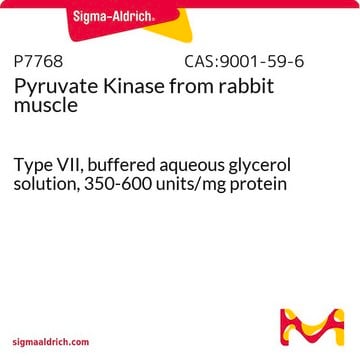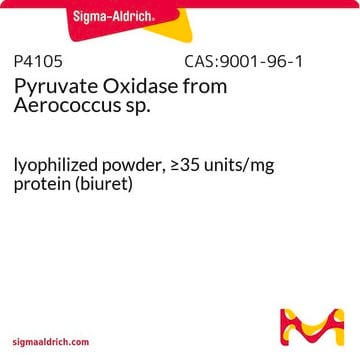P1903
Pyruvate Kinase from Bacillus stearothermophilus
Type VIII, lyophilized powder, 100-300 units/mg protein
Sinónimos:
ATP:pyruvate 2-O-phosphotransferase, PK
Iniciar sesiónpara Ver la Fijación de precios por contrato y de la organización
About This Item
Productos recomendados
biological source
Bacillus sp. (B. stearothermophilus)
Quality Level
type
Type VIII
form
lyophilized powder
specific activity
100-300 units/mg protein
storage temp.
2-8°C
General description
Research Area: CELL SIGNALING
Mammalian pyruvate kinase is a tetrameric protein composed of identical subunits organized in a dimer-of-dimers configuration. Four isoforms of pyruvate kinase exist in mammals, namely PKM1, PKM2, PKR, and PKL. Pyruvate kinase can be found in both tetrameric and dimeric forms.
Mammalian pyruvate kinase is a tetrameric protein composed of identical subunits organized in a dimer-of-dimers configuration. Four isoforms of pyruvate kinase exist in mammals, namely PKM1, PKM2, PKR, and PKL. Pyruvate kinase can be found in both tetrameric and dimeric forms.
Application
Pyruvate Kinase from Bacillus stearothermophilus may be used in biofuel production.
Pyruvate kinase from Bacillus stearothermophilus has been used in a study to assess evidence that the genes for phosphofructokinase and pyruvate kinase constitute an operon. It has also been used in a study to investigate the importance of the Lys221 active site for pyruvate kinase activity.
Biochem/physiol Actions
Pyruvate Kinase from Bacillus stearothermophilus is activated by AMP and ribose 5-phosphate.
Pyruvate kinase is an enzyme that facilitates the conversion of phosphoenolpyruvate (PEP) and ADP to pyruvate and ATP in glycolysis and is involved in the regulation of cell metabolism. It serves as a terminal enzyme in the glycolytic pathway. This reaction is favorable due to the high energy of hydrolysis of PEP.
Pyruvate kinase is a key regulator controlling metabolic flux and ATP production in glycolysis and is considered a potential drug target. Additionally, pyruvate kinases are subject to regulation by heterotropic effectors, with fructose 1,6-bisphosphate (FBP) being the most widely known allosteric activator of bacterial, yeast, and mammalian enzymes. Furthermore, PKM2, one of the four isoforms of pyruvate kinase, is extensively expressed in various types of tumors and is associated with tumorigenesis.
Pyruvate kinase is a key regulator controlling metabolic flux and ATP production in glycolysis and is considered a potential drug target. Additionally, pyruvate kinases are subject to regulation by heterotropic effectors, with fructose 1,6-bisphosphate (FBP) being the most widely known allosteric activator of bacterial, yeast, and mammalian enzymes. Furthermore, PKM2, one of the four isoforms of pyruvate kinase, is extensively expressed in various types of tumors and is associated with tumorigenesis.
Unit Definition
One unit will convert 1.0 μmole of phospho(enol)pyruvate to pyruvate per min at pH 7.2 at 30 °C.
Physical form
Lyophilized powder containing Tris buffer salts, pH 8.5
Analysis Note
Protein determined by biuret
Storage Class
11 - Combustible Solids
wgk_germany
WGK 3
flash_point_f
Not applicable
flash_point_c
Not applicable
ppe
Eyeshields, Gloves, type N95 (US)
Certificados de análisis (COA)
Busque Certificados de análisis (COA) introduciendo el número de lote del producto. Los números de lote se encuentran en la etiqueta del producto después de las palabras «Lot» o «Batch»
¿Ya tiene este producto?
Encuentre la documentación para los productos que ha comprado recientemente en la Biblioteca de documentos.
Los clientes también vieron
Crystallization and preliminary X-ray analysis of pyruvate kinase from Bacillus stearothermophilus
Suzuki, K.
Acta Crystallographica Section B, Structural Crystallography and Crystal Chemistry, F61, 759-761 (2005)
Mutagenesis of the active site lysine 221 of the pyruvate kinase from Bacillus stearothermophilus
Sakai, H.
The Journal of Biological Chemistry, 137, 141-145 (2005)
An overview of structure, function, and regulation of pyruvate kinases
Schormann N, et al.
Protein Science, 28(10), 1771-1784 (2019)
E W Walters et al.
Plant physiology, 114(2), 549-555 (1997-06-01)
Adenylosuccinate synthetase (AdSS) is the site of action hydantocidin, a potent microbial phytotoxin. A kinetic analysis of the mode of inhibition of a plant adenylosuccinate synthetase by the active metabolite 5'-phosphohydantocidin (5'-PH) was the objective of the present study. AdSS
Molecular cloning and nucleotide sequence of the gene for pyruvate kinase of Bacillus stearothermophilus and the production of the enzyme in Escherichia coli. Evidence that the genes for phosphofructokinase and pyruvate kinase constitute an operon
Sakai, H. and T. Ohta
FEBS Journal, 211, 851-859 (1993)
Nuestro equipo de científicos tiene experiencia en todas las áreas de investigación: Ciencias de la vida, Ciencia de los materiales, Síntesis química, Cromatografía, Analítica y muchas otras.
Póngase en contacto con el Servicio técnico












